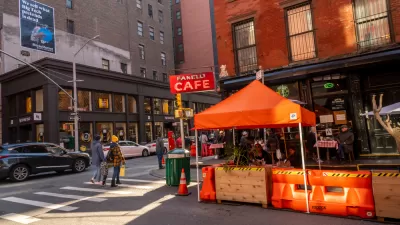New regulations and fees for outdoor dining patios, extended from a pandemic-era program, are making the process overly complicated and expensive for business owners.

In an opinion piece for the Toronto Star, Edward Keenan criticizes the Toronto for “ruining” the CaféTO outdoor dining program in the process of trying to make it permanent.
After the city reduced the onerous fees and rules imposed by a first draft of the program in January, applicants now say they are waiting months for approvals. For Keenan, this is unacceptable. “Let me make this as clear as I can: the patio season in Toronto is short, maybe 100 days a year. If the ‘detailed review’ process you’ve set up for patio approvals takes well into the warm weather patio season to conclude, then you’ve botched it.”
Here’s the core thing to understand: these patios make the city a better place — they are good for business, good for neighbourhoods, good for the liveliness of streets. We should be begging shopkeepers to install them. Instead we’ve made it difficult.
Keenan notes that this isn’t the only way the city finds “something we actively want or need people to do,” then makes residents “ jump through (often expensive) hoops to do it.” The same applies to building denser housing, Keenan writes.
For Keenan, this fails to internalize the lessons of the pandemic, which showed that “when our backs are against the wall, we can do things, through our government, together — and we can do them quickly.”
FULL STORY: We are slowly but surely killing the CaféTO patio program. Shame on us

Study: Maui’s Plan to Convert Vacation Rentals to Long-Term Housing Could Cause Nearly $1 Billion Economic Loss
The plan would reduce visitor accommodation by 25,% resulting in 1,900 jobs lost.

North Texas Transit Leaders Tout Benefits of TOD for Growing Region
At a summit focused on transit-oriented development, policymakers discussed how North Texas’ expanded light rail system can serve as a tool for economic growth.

Why Should We Subsidize Public Transportation?
Many public transit agencies face financial stress due to rising costs, declining fare revenue, and declining subsidies. Transit advocates must provide a strong business case for increasing public transit funding.

How to Make US Trains Faster
Changes to boarding platforms and a switch to electric trains could improve U.S. passenger rail service without the added cost of high-speed rail.

Columbia’s Revitalized ‘Loop’ Is a Hub for Local Entrepreneurs
A focus on small businesses is helping a commercial corridor in Columbia, Missouri thrive.

Invasive Insect Threatens Minnesota’s Ash Forests
The Emerald Ash Borer is a rapidly spreading invasive pest threatening Minnesota’s ash trees, and homeowners are encouraged to plant diverse replacement species, avoid moving ash firewood, and monitor for signs of infestation.
Urban Design for Planners 1: Software Tools
This six-course series explores essential urban design concepts using open source software and equips planners with the tools they need to participate fully in the urban design process.
Planning for Universal Design
Learn the tools for implementing Universal Design in planning regulations.
City of Santa Clarita
Ascent Environmental
Institute for Housing and Urban Development Studies (IHS)
City of Grandview
Harvard GSD Executive Education
Toledo-Lucas County Plan Commissions
Salt Lake City
NYU Wagner Graduate School of Public Service




























